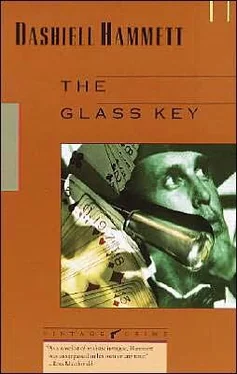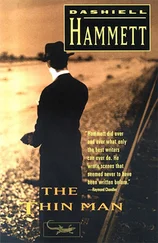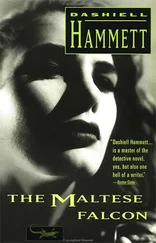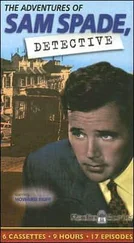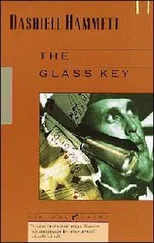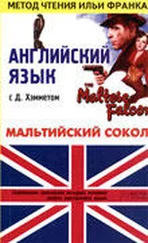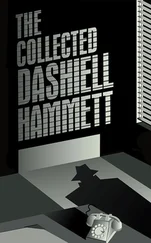The bell continued to ring. He groaned, opened his eyes again, and squirmed until he had freed his left arm from beneath his body. He put his wrist close to his eves and looked at his watch, squinting. The watch's crystal was gone and its hands had stopped at twelve minutes to twelve.
Ned Beaumont squirmed again on the sofa until he was leaning on his left elbow, holding his head up on his left hand. The telephone-bell was still ringing. He looked around the room with miserably dull eyes. The lights were burning. Through an open doorway he could see Fedink's blanket-covered feet on an end of the day-bed.
He groaned again and sat up, running fingers through his tousled dark hair, squeezing his temples between the heels of his palms. His lips were dry and brownly encrusted. He ran his tongue over them and made a distasteful face. Then he rose, coughing a little, took off his gloves and overcoat, dropped them on the sofa, and went into the bathroom.
When he came out he went to the day-bed and looked down at Fedink. She was sleeping heavily, face down, one blue-sleeved arm crooked above her head. The telephone-bell had stopped ringing. He pulled his tie straight and returned to the living-room.
Three Murad cigarettes were in an open box on the table between two chairs. He picked up one of the cigarettes, muttered, "Nonchalant," without humor, found a paper of matches, lit the cigarette, and went into the kitchen. He squeezed the juice of four oranges into a tall glass and drank it. He made and drank two cups of coffee.
As he came out of the kitchen Fedink asked in a woefully flat voice: "Where's Ted?" Her one visible eye was partially open.
Ned Beaumont went over to her. "Who's Ted?" he asked.
"That fellow I was with."
"Were you with somebody? How do I know?"
She opened her mouth and made an unpleasant clucking sound shutting it. "What time is it?"
"I don't know that either. Somewhere around daylight."
She rubbed her face into the chintz cushion under it and said: "A swell guy I turned out to be, promising to marry him yesterday and then leaving him to take the first tramp I run into home with me." She opened and shut the hand that was above her head. "Or am I home?"
"You had a key to the place, anyway," Ned Beaumont told her. "Want some orange-juice and coffee?"
"I don't want a damned thing except to die. Will you go away, Ned, and not ever come back?"
"It's going to be hard on me," he said ill-naturedly, "but I'll try."
He put on his overcoat and gloves, took a dark wrinkled cap from one overcoat-pocket, put the cap on, and left the house.
5
Half an hour later Ned Beaumont was knocking on the door of room 734 at his hotel. Presently Jack's voice, drowsy, can-me through the door: "Who's that?"
"Beaumont."
"Oh," without enthusiasm, "all right."
Jack opened the door and turned on the lights. He was in green-spotted pajamas. His feet were bare. His eyes were dull, his face flushed, with sleepiness. He yawned, nodded, and went back to bed, where he stretched himself out on his back and stared at the ceiling. Then he asked, with not much interest: "How are you this morning?"
Ned Beaumont had shut the door. He stood between door and bed looking sullenly at the man in the bed. He asked: "What happened after I left?"
"Nothing happened." Jack yawned again. "Or do you mean what did I do?" He did not wait for a reply. "I went out and took a plant across the street till they came out. Despain and the girl and the guy that slugged you came out. They went to the Buckman, Forty-eighth Street. That's where Despain's holing up—apartment 938—name of Barton Dewey. I hung around there till after three and then knocked off. They were all still in there unless they were fooling me." He jerked his head slightly in the direction of a corner of the room. "Your hat's on the chair there. I thought I might as well save it for you."
Ned Beaumont went over to the chair and picked up the hat that did not quite fit him. He stuffed the wrinkled dark cap in his overcoat pocket and put the hat on his head.
Jack said: "There's some gin on the table if you want a shot."
Ned Beaumont said: "No, thanks. Have you got a gun?"
Jack stopped staring at the ceiling. He sat up in bed, stretched his arms out wide, yawned for the third time, and asked: "What are you figuring on doing?" His voice held nothing beyond polite curiosity.
"I'm going to see Despain."
Jack had drawn his knees up, had clasped his hands around them, and was sitting hunched forward a little staring at the foot of the bed. He said slowly: "I don't think you ought to, not right now."
"I've got to, right now," Ned Beaumont said.
His voice made Jack look at him. Ned Beaumont's face was an unhealthy yellowish grey. His eyes were muddy, red-rimmed, not sufficiently open to show any of the whites. His lips were dry and somewhat thicker than usual.
"Been up all night?" Jack asked.
"I got some sleep."
"Unkdray?"
"Yes, but how about the gun?"
Jack swung his legs out from beneath the covers and down over the side of the bed. "Why don't you get some sleep first? Then we can go after them. You're in no shape now."
Ned Beaumont said: "I'm going now."
Jack said: "All right, but you're wrong. You know they're no babies. to go up against shaky. They mean it."
"Where's the gun?" Ned Beaumont asked.
Jack stood up and began to unbutton his pajama-coat.
Ned Beaumont said: "Give me the gun and get back in bed. I'm going."
Jack fastened the button he had just unfastened and got into bed. "The gun's in the top bureau-drawer," he said. "There are extra cartridges. in there too if you want them." He turned over on his side and shut his eyes.
Ned Beaumont found the pistol, put it in a hip-pocket, said, "See you later," switched off the lights, and went out.
6
The Buckman was a square-built yellow apartment-building that filled most of the block it stood in. Inside, Ned Beaumont said he wanted to see Mr. Dewey. When asked for his name he said: "Ned Beaumont."
Five minutes later he was walking away from an elevator down a long corridor towards an open door where Bernie Despain stood.
Despain was a small man, short and stringy, with a head too large for his body. The size of his head was exaggerated until it seemed a deformity by long thick fluffy waved hair. His face was swarthy, large-featured except for the eyes, and strongly lined across the forehead and down from nostrils past the mouth. He had a faintly reddish scar on one cheek. His blue suit was carefully pressed and he wore no jewelry.
He stood in the doorway, smiling sardonically, and said: "Good morning, Ned."
Ned Beaumont said: "I want to talk to you, Bernie."
"I guessed you did. As soon as they phoned your name up I said to myself: 'I bet you he wants to talk to me.'"
Ned Beaumont said nothing. His yellow face was tight-lipped.
Despain's smile became looser. He said: "Well, my boy, you don't have to stand here. Come on in." He stepped aside.
The door opened into a small vestibule. Through an opposite door that stood open Lee Wilshire and the man who had struck Ned Beaumont could be seen. They had stopped packing two traveling-bags to look at Ned Beaumont.
He went into the vestibule.
Despain followed him in, shut the corridor-door, and said: "The Kid's kind of hasty and when you come up to me like that he thought maybe you were looking for trouble, see? I give him hell about it and maybe if you ask him he'll apologize."
The Kid said something in an undertone to Lee Wilshire, who was glaring at Ned Beaumont. She laughed a vicious little laugh and replied: "Yes, a sportsman to the last."
Bernie Despain said: "Go right in, Mr. Beaumont. You've already met the folks, haven't you?"
Читать дальше
